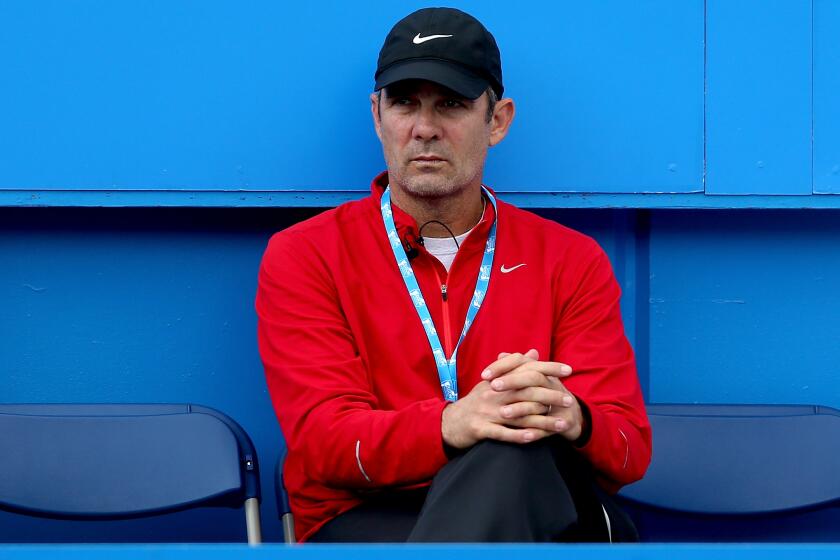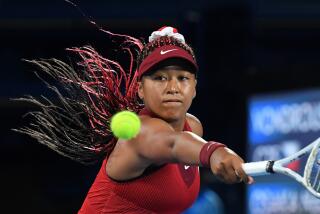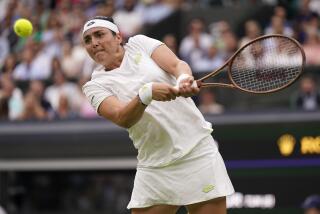Column: Once-dominant Serena Williams faces hard reality after loss to Naomi Osaka
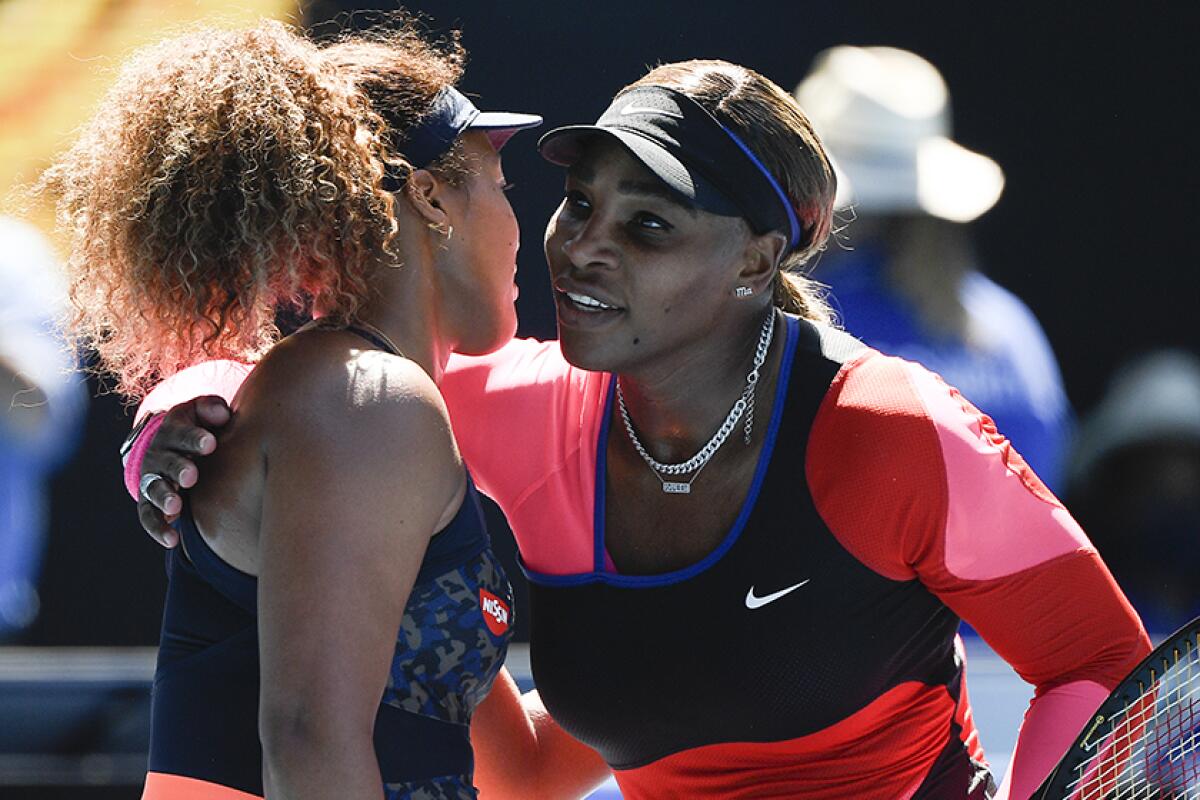
Serena Williams’ departure after her Australian Open semifinal loss to Naomi Osaka had an air of wistful finality to it. Hand over her heart, her emotions brimming, Williams disappeared from view of the fans who had cheered her so steadily at Rod Laver Arena and was left alone with her thoughts — and with the realization her days of domination are over.
Williams, 39, had used her time well during the pandemic and was in the best shape she’d been in since she gave birth to her daughter, Alexis Olympia, in 2017 and endured life-threatening complications. She had moved well during through the first five rounds in Melbourne, covering ground with renewed speed and vigor. The title she needed to equal Margaret Court’s Grand Slam singles record of 24 seemed within her reach in this, her 11th try at it.
“I felt well. I felt like I was hitting well. I was hitting well this whole tournament,” said Williams, a seven-time Australian Open champion. “Even the first couple of games I played well.”
Osaka started slowly, admittedly nervous about facing her childhood idol. Not so long ago, Williams would have exploited that vulnerability. But as in their tumultuous encounter in the 2018 U.S. Open final, Osaka’s will and execution were greater, and Williams was left to face hard reality.
Osaka overcame an inconsistent serve with relentless forehands and ferocity, earning a 6-3, 6-4 victory and a berth in Saturday’s final. In vying for her fourth Slam singles title she will face former UCLA standout Jennifer Brady, who needed five match points to become a first-time Slam finalist and defeat Karolina Muchova of the Czech Republic 6-4, 3-6, 6-4. Brady and Osaka met in a terrific U.S. Open semifinal last year, won in three sets by Osaka.
Williams said her 24 unforced errors were the difference in the match, which doesn’t give Osaka enough credit. But Williams’ forehand clearly wouldn’t behave on a hot Thursday afternoon (Australia time) on the hard court. “Just made too many mistakes there, easy mistakes. It was a big error day for me,” Williams said.
She said her gesture while walking off was merely her way of saying thanks to the crowd. It seemed like she might have been saying goodbye, too. “I don’t know. If I ever say farewell, I wouldn’t tell anyone,” she said.
That day might not be far off. Losing to 23-year-old Osaka undoubtedly brought that home. Williams no longer has the best serve or the most power on the pro tour, though it’s a tribute to her that Osaka and other young women have modeled themselves after her. This can’t be easy for Williams, after a glorious and groundbreaking career, and she broke into tears when asked about the cause of all those errors against Osaka. “I don’t know. I’m done,” she said, gathering her belongings and leaving the room.
Osaka couldn’t hold serve in the first game of the first set and was nearly broken again in the third game but held on in part because of Williams’ unforced errors. Williams committed 24, to 21 by Osaka. “It’s very intimidating to serve for the first game and see her on the other side off the net,” said Osaka, who was born in Japan to a Japanese mother and Haitian father and now lives in Los Angeles.
“I’ve grown up watching what she does to people’s serves when they’re soft, I guess. I think that’s also why my serve percentage was bad today, because I was thinking about what could happen if I didn’t serve perfectly.”
Fighting off a break point for Williams in that third game started a five-game winning streak for Osaka. Williams held serve to stop Osaka’s streak, but Osaka closed out the set on her first set point with a forehand winner.
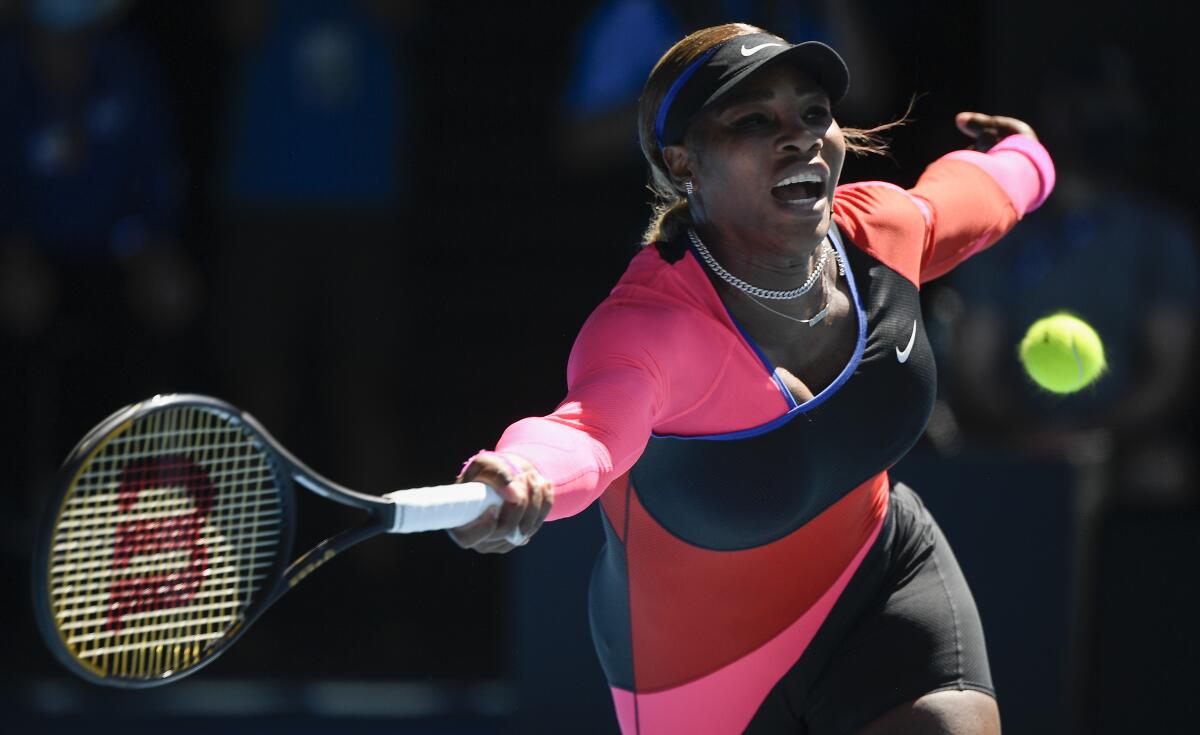
Osaka opened the second set by breaking Williams’ serve and consolidated that by holding serve to win the second game, which she polished off with two aces. Fans, allowed back into the stadium after a five-day lockdown in Melbourne, began to pull for Williams and she drew strength from them. But Osaka recovered from 0-15 in the sixth game and won it with an ace for a 4-2 lead. Although Williams leveled the set at 4-4, Osaka broke at love with a backhand winner and clinched it on her first match point.
“I have this mentality that people don’t remember the runners-up. You might, but the winner’s name is the one that’s engraved,” Osaka said of her ability to play well when the stakes are highest. “I think I fight the hardest in the finals. I think that’s where you sort of set yourself apart.”
Brady was among the players obligated to undergo a 14-day, hard lockdown when they arrived in Australia as the result of COVID protocols. She couldn’t leave her room to practice; she subsisted on food deliveries and FaceTime visits. Since she was behind in training, it’s surprising she reached the final. She didn’t expect it, either. “Even before quarantine, I didn’t think I would be where I am right now, totally not,” said Brady, who contributed to UCLA’s 2014 NCAA women’s title.
Paul Annacone aims to help revive U.S. men’s tennis as a new member of the player development staff of the Southern California section of the U.S. Tennis Assn.
“I’ve definitely been practicing hard. I think I’ve earned the right to be playing in a Grand Slam final on Saturday. I just think it’s crazy to believe.”
At the end, Brady said, she said she was so jittery that her arms were shaking and she couldn’t feel her legs. She expects more of that in the final. “On Saturday I’ll definitely be nervous 100% but there’s no hiding it,” she said. “I just have to embrace it and enjoy the moment.”
As Osaka walked out to the court for the match she tapped her name on the wall that honors past winners, as if to draw assurance from it. At her post-match news conference Osaka — who was mentored by Kobe Bryant — wore a Lakers jacket for similar reasons. “Today I felt like I needed some extra strength,” she said. She found it, and in that she is a worthy successor to Williams.
More to Read
Go beyond the scoreboard
Get the latest on L.A.'s teams in the daily Sports Report newsletter.
You may occasionally receive promotional content from the Los Angeles Times.

